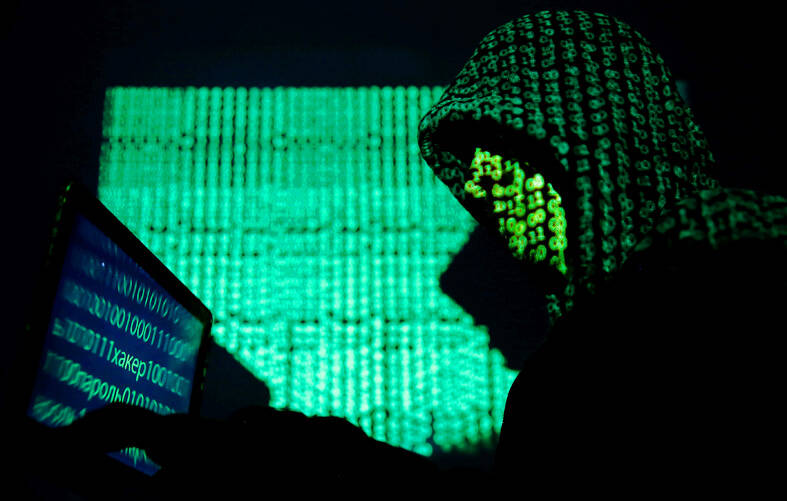A recent spate of blackmail incidents using “deepfake” photographs and videos to extort medical personnel and academics originated in China, the Taipei Police Department said yesterday, while the Ministry of Justice Bureau of Investigation (MJIB) reported an election-focused use of manipulated video.
Male medical personnel at Taipei City Hospital reported to police on July 19 that they had received e-mails containing black-and-white images of them in a bed embracing a woman.
The e-mail warned the recipient to keep a low profile and contact an individual through Line, or a video of them would be released, the police said.

Photo: Reuters
The Taipei Police Department’s Criminal Investigation Division said that the Internet protocol addresses associated with the e-mails and the Line chats originated from China and Hong Kong.
The investigation also showed that lecturers at National Tsing Hua University and National Cheng Kung University have also reported receiving similar e-mails threatening to publicize the photographs in March.
The police said they have forwarded the matter to prosecutors’ offices and are also launching a broader investigation into similar incidents.
Meanwhile, cybersecurity experts say the ready availability of candidates’ photos and videos combined with easy access to photo, video and voice-manipulation technology could pose a security risk if groups create and spread false photos and videos online ahead of January’s elections.
Prosecutor-General Hsing Tai-chao (邢泰釗) last week said that the Supreme Prosecutors’ Office has instructed district prosecutors’ offices across the nation to establish a task force to handle false information generated using artificial intelligence or deepfake technology.
The Ministry of Justice Bureau of Investigation yesterday said that a video clip recently circulated on social media allegedly featuring Vice President William Lai (賴清德), the Democratic Progressive Party’s presidential candidate, was altered with deepfake technology.
In the video, “Lai” says: “I must stress that regardless of the blue or white camps, they are all political parties representing mainstream public opinions.”
The bureau said it is still investigating the issue, adding that spreading or streaming clips, videos or sounds involving presidential candidates that have been altered by deepfake technology contravenes the Presidential and Vice Presidential Election and Recall Act (總統副總統選舉罷免法).
Members of the public should verify information before they share it online to avoid inadvertently contravening the law, it said.

Chinese spouse and influencer Guan Guan’s (關關) residency permit has been revoked for repeatedly posting pro-China videos that threaten national security, the National Immigration Agency confirmed today. Guan Guan has said many controversial statements in her videos posted to Douyin (抖音), including “the red flag will soon be painted all over Taiwan” and “Taiwan is an inseparable part of China,” and expressing hope for expedited reunification. The agency last year received multiple reports alleging that Guan Guan had advocated for armed reunification. After verifying the reports, the agency last month issued a notice requiring her to appear and explain her actions. Guan

GIVE AND TAKE: Blood demand continues to rise each year, while fewer young donors are available due to the nation’s falling birthrate, a doctor said Blood donors can redeem points earned from donations to obtain limited edition Formosan black bear travel mugs, the Kaohsiung Blood Center said yesterday, as it announced a goal of stocking 20,000 units of blood prior to the Lunar New Year. The last month of the lunar year is National Blood Donation Month, when local centers seek to stockpile blood for use during the Lunar New Year holiday. The blood demand in southern Taiwan — including Tainan and Kaohsiung, as well as Chiayi, Pingtung, Penghu and Taitung counties — is about 2,000 units per day, the center said. The donation campaign aims to boost

The Kaohsiung Tourism Bureau audited six hotels in an effort to prevent price gouging ahead of Korean band BTS’ concert tour in the city scheduled for Nov. 19, 21 and 22 this year. The bureau on Friday said that the audits — conducted in response to allegations of unfair pricing posted on social media — found no wrongdoing. These establishments included the local branches of Chateau de Chine, Hotel Nikko, My Humble House, and Grand Hai Lai, it said, adding that the Consumer Protection Commission would have penalized price gougers had the accusations been substantiated. The bureau said the Tourism Development Act

The military yesterday said it has located the flight data recorder, or black box, of an F-16V jet that disappeared off eastern Taiwan earlier this month, and it would soon deploy a salvage team to try to retrieve it. Air Force Command Headquarters said that while it had pinned down the location of the black box, it was still searching for the aircraft’s sole pilot, air force Captain Hsin Po-yi (辛柏毅). Without providing details, the air force said it had located the black box days after detecting some intermittent signals and would now engage a team of professionals to retrieve it. The air